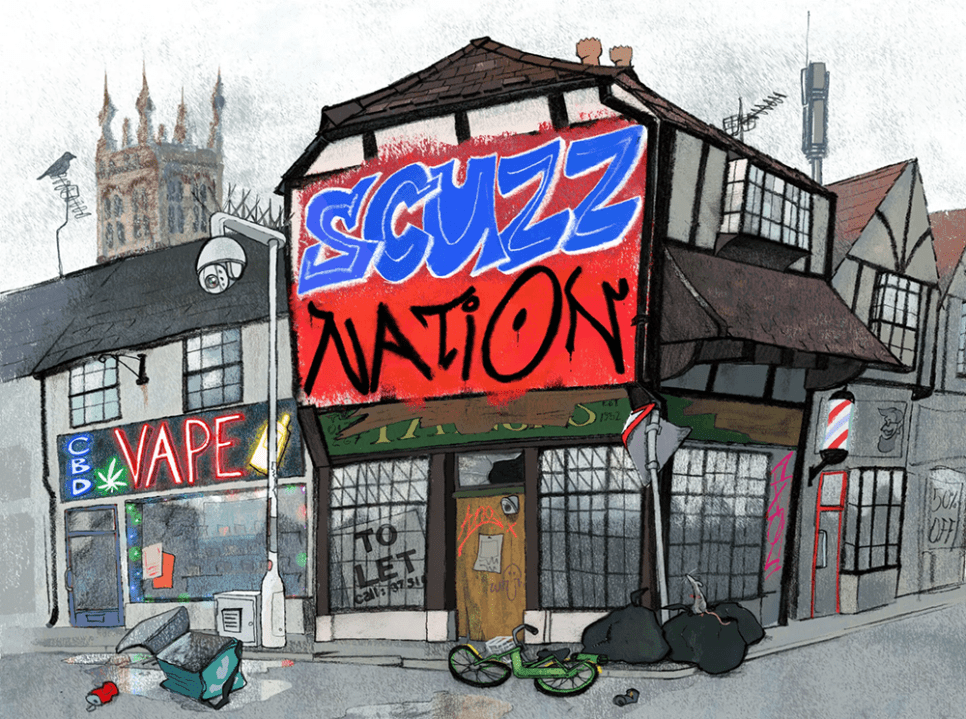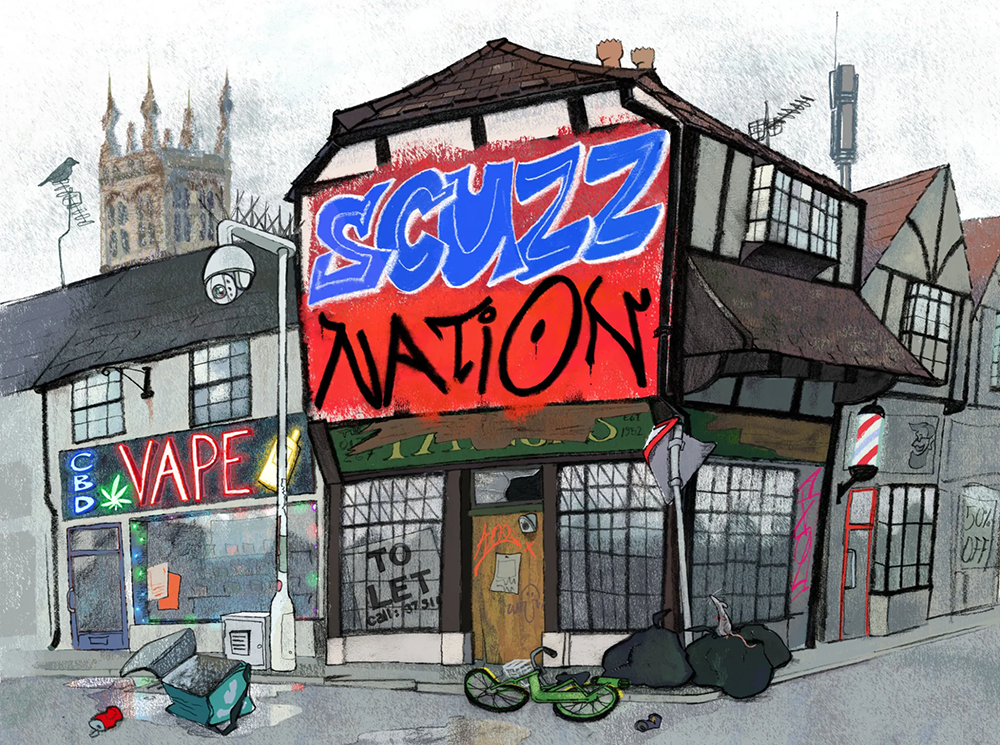
Decline and brawl
Sir: Gus Carter’s insightful portrayal of ‘Scuzz Nation’ (‘Streets of shame’, 10 May) is less of a howl of anguish about Starmer’s Britain than an indictment of previous governments of all stripes since the late 1970s. It is also, to me, a call for more sophisticated thinking about the nature of governance in the 21st century.
Carter shows, using lots of telling examples that we all recognise, that neither the state in its current form nor the private sector can cope with the multiplicity of challenges posed by a modern society. Of the state’s impotence, the current government is not the principal offender. To illustrate my point, just listen to a week’s worth of the Today programme and all the requests for extra funding that are heard every day. Politics is about choices; but no government can hope to get the balance right between so many competing demands.
In Carter’s conclusion that the nation is suffering from ‘the worst of market capitalism’ and an ‘ever growing, ever more useless state’, it is clear that new ways forward are required. We have arguably reached the point where lives are nasty and brutish with Leviathan, so who is bold enough to renew the Hobbesian vision for the 21st century? And no, sorry to disappoint, the answer is not Reform.
Andrew Mitchell
Bourne, Lincolnshire
Ghost town
Sir: Gus Carter gave a perfect description of many towns in his article. For many years, although being a ‘child of the Industrial Revolution’, Rotherham was a decent working-class town with a variety of shops and services. It is now a ghostly shadow of its former self and the town centre is not a place to linger at any time. The construction of the Meadowhall Shopping Centre just a few miles away is a continuing success story of retail, but in recent years has become a convenient scapegoat for the town’s tragic but avoidable decline. The recent grooming scandal was just another metaphorical nail in the coffin.
John Scanlon
Rotherham
Asking price
Sir: I am a regular reader of Mary Wakefield, who I always find entertaining, but I think she and the aggrieved friends she quotes are taking the wrong attitude here (‘Question time’, 10 May). The last thing I want to be asked by a date, or to ask them, are ‘deep, insightful’ questions. How about actual conversation instead? How about jokes, politics, banter, things we both find interesting, books, whether they support Ulez or think ‘organic’ wines are a con – rather than impersonating a YouTube shrink to ask me to overshare, boring both them and me? Whatever became of being ‘good company’? There’s always time, if we feel we’re compatible, to tentatively hazard one personal remark after a suitable amount of time. Say one or two years. Or five.
Anne-Elisabeth Moutet
Paris
Supersize me
Sir: Hannah Moore should turn to the land of the rising sun for her seven-seater MPV (‘Road rage’, 10 May). Back in the 1990s my wife and I could transport in our Toyota Previa six members of the boys’ junior rugby team to away matches – with ample room for kit and lunches too. The Previa is (sadly) long gone but there are rumours it may be resurrected in EV form in 2026. If she can’t wait that long Toyota still turn out the many-seater hybrid ‘Sienna’ MPV.
Charles Mercey
Tellisford, Somerset
Post haste
Sir: Melanie McDonagh’s experiences of the postal service (‘Junk mail’, 10 May) contrast greatly with the past. One of my favourite books of letters are those between Vita Sackville-West and Virginia Woolf. Vita often wrote late in the afternoon to catch the post from Sissinghurst – so small a village that there was then no bus stop – yet Virginia received the letter in London by early evening. What chance of any such flourishing romance now?
The Revd Steve Wood
Streatley, Bedfordshire
Bunny abundance
Sir: Please inform Henry Williams (‘Forlorn hop’, 19 April) that we have plenty of wild rabbits hopping about here – even in broad daylight. After a welcome cold winter, they nibbled my small evergreens and shrubs down to twigs. Maybe we could export some? We need a tariff agreement. You could maybe get some from Australia too.
Geoffrey Corfield
London, Canada
Soaring spirits
Sir: The Marsala wine market in Sicily was not slumbering in the 19th century (Drink, 3 May). One fortunate outcome of the wine trade was the creation of the beautiful Anglican Church of the Holy Cross in Palermo. In 1871 the cousins Joseph Whitaker and Benjamin Ingham announced their plan to build a church where services could be held for ‘the spiritual benefit of their Protestant countrymen, whether resident or visiting Palermo’.
The pair were nephews and heirs of Benjamin Ingham Sr, who came to Sicily in 1802 and built up a successful business based on the sale of Marsala wine. He donated land in front of his residence Palazzo Ingham (now the Hotel des Palmes) as the site of the new church. Many of the materials used in its construction were brought from England, and it was consecrated in December 1875. It has many precious objects, with notable Italian mosaics in the apse and stained glass. It is little known to the people of Palermo and almost ignored in tourist guides. It has a lively resident congregation of many nationalities, including Italians. The services are in English and visitors are made very welcome.
Judith Paston
Swardeston, Norfolk








Comments